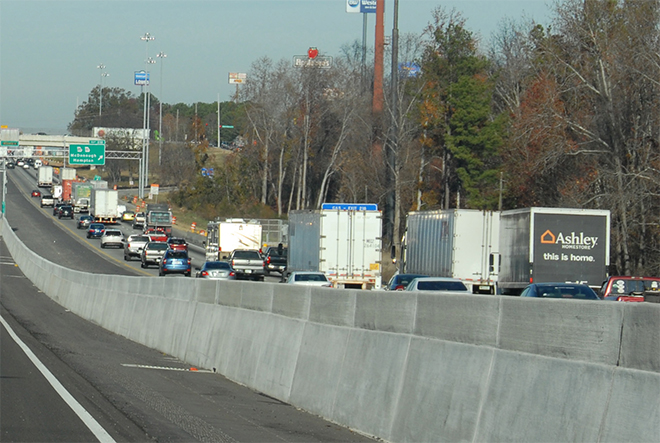Staff Reporter
TRIP Report Shows Georgia’s Infrastructure Funding Will Need Boost Despite Transportation Bill

Although Georgia’s most recent transportation funding bill has generated enough to finance some major future projects, it will not be able to keep pace with the state’s growing infrastructure and capacity needs, according to a recent report from The Road Information Program.
The program, known as TRIP, is a nonprofit group that researches surface transportation issues and promotes policies relating to traffic relief and travel safety. TRIP published a study called “Modernizing Georgia’s Transportation System” on May 31. The report indicates that, although the state’s Transportation Funding Act provides funds for certain projects to reach completion in the coming years, more revenue is needed to maintain infrastructure needs amid a growing population and worsening congestion.
Georgia’s Transportation Funding Act, passed in 2015, approved $5.4 billion for infrastructure projects from 2016 to 2021. The legislation updated the excise tax on fuel to 26 cents per gallon for gasoline and 29 cents per gallon on diesel, added a $200 fee on personal electric vehicles and a $300 fee for commercial electric vehicles and instated a heavy-truck impact fee of $50 to $100 depending on the weight of the vehicle.

Traffic on I-75 in Atlanta. (Georgia Department of Transportation)
Revenue collected through the act goes toward maintenance, preservation, reconstruction and capacity expansion projects. According to the report, the funding will support bridge maintenance and route-widening projects in the areas surrounding several cities, including Atlanta, Augusta, Columbus, Macon and Savannah.
It’s the unofficial start to summer and that means Georgia DOT is gearing up to improve our roadways. We’ll be giving you a #BehindTheScenes look at our projects as well as in depth interviews. You don’t want to miss it! Click here to learn more! https://t.co/YVDnhWnvnL pic.twitter.com/JZCWpdS0u1 — Georgia DOT (@GADeptofTrans) May 30, 2018
“While the recent influx of funding has allowed Georgia to make strides in improving its transportation system, more work still needs to be done to accommodate and capitalize on the tremendous growth projected for the state,” TRIP Executive Director Will Wilkins said in a statement. “Georgia will need to continue to make transportation investment a top priority.”
According to the report, Georgia’s population is projected to increase by 2.5 million people over the next 20 years. Georgia ranked No. 6 on the U.S. Census Bureau’s list of top 10 states in numeric growth from 2016 to 2017. The state saw a population increase of more than 15,000 people during this window.
TRIP’s report states that the quality of surface infrastructure bears significant implications for the business community. About $790 billion in goods are shipped to and from Georgia every year. Some 79% of these goods are carried by trucks, and an additional 12% travel by multimodal deliveries, including trucking.
Freight haulers moving through Georgia often encounter some thorny interchanges. Atlanta is home to two of the most congested freight bottlenecks in the country. The city’s five-level stack interchange known as “Spaghetti Junction,” where Interstate 285 and I-85 North intersect, ranked No. 1 on American Transportation Research Institute’s 2018 study on the 100 most congested truck bottlenecks in the country. The intersection of I-75 and I-285 North in Atlanta ranked No. 4.
“The efficiency of Georgia’s transportation system, particularly its highways, is critical to the state’s economy,” TRIP’s report says. “Businesses rely on an efficient and dependable transportation system to move products and services.”
The report found that, while the state has sufficient funds to reduce the number of roads in poor or bad condition, it does not have enough money to sustain the number of roads that are in excellent or good condition. TRIP projects that the percentage of roads in poor or bad condition will fall from 13% in 2016 to zero in 2019, but the percentage of roads in excellent or good condition will fall from 49% in 2016 to 15% in 2024.
The study identified several projects, including interchange configurations and widening efforts in the Atlanta area, that lack sufficient funding to proceed prior to 2022. Other projects include widening a portion of I-20 through Augusta and the elevation of a bridge near Savannah.
TRIP’s report demonstrates the time and money that is lost to congestion. For example, the report found that motorists moving through Atlanta generally lose about $1,226 and 56 hours a year to congestion. People moving through Savannah, which contains one of the busiest ports in the country, lose about $697 and 32 hours a year.
“Additional funding is without question still necessary in order to fully meet our needs, and we are hopeful we will be able to attract federal support while identifying additional state and local resources,” Georgia Department of Transportation Commissioner Russell McMurry said.




